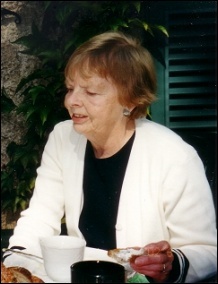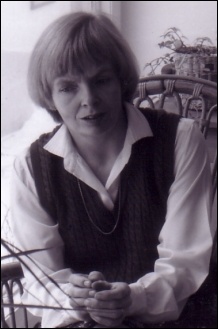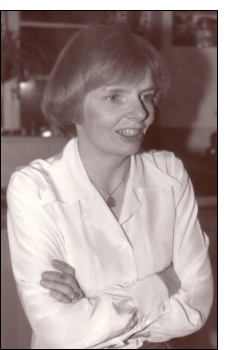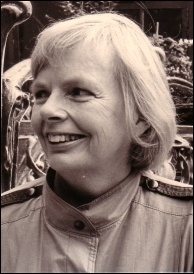|
Carol's Thoughts
Carol on Men
 
I do love good men, and have
had a number of them in my life. Men deserve novelistic space.
And good marriages - how rare they are - can help us from blaming
men. I do not believe that men wake up every morning and think:
How can I oppress women today? They are as caught up as we are
in our assigned roles - but they have power and we don't."
[Interview May
10, 2002, Bookreporter.com]

I think men want to be around women. They enjoy their womanliness
and get relief from it. But I also think that they may not care
much about how the synapses of a woman's brain operate."
[Interview by Barbara Ellen,
April 28, 2002, The Observer]
Carol on Religion

I was brought up in the Methodist Church in the United
States, then in the United Church of Canada, and then became a
Quaker and then became nothing. I still call myself a Quaker,
although I don't go to meetings any longer. I feel a certain kinship
and nostalgia for my Protestant background, and those that shared
it, the whole community. But I haven't been a believer for a long
time, and I think I always knew, in one way or another, that it
was a metaphor. The Old Testament was this sort of metaphor for
beginning, and the New Testament a metaphor for beginning again.
I think I always knew that. I wasn't able to manage the other
beliefs."
[Interview with Terry Gross
on Public Radio, May 1, 2002]
Carol on her Legacy
 
People think that [leaving my
books as my legacy] would make a difference. People say this to
me, "At least you've written your books." The kind of people who
say, "What have I done in my life? Etc." But the fact is, I don't
know that. You know, I am a realist, and I know the shelf life
of a book is about four months. The day that I got the Pulitzer
Prize, I met Margot Jefferson and she said, "You know what this
means, don't you?" And I said, "No, what?" And she said,
"You already know the first line of your obituary." And of course
I do. I found that rather frightening. But someone sent me a list
of all the Pulitzer Prize winners since something like 1915, I
think, and half of them I'd never heard of, half of them. So I
don't think literary reputations live on, very few of them. Books,
you know, fall out of the public eye. So I don't have a sense
of leaving anything permanent at all. I suppose one thinks of
one's children as what you leave permanently, and their children.
Naturally I like to write books that people enjoy reading, but
the literary legacy, no it's very unimportant to me."
[Interview with Terry Gross
on Public Radio, May 1, 2002]
Carol on Death

I'm not afraid of death. I've
had three years, kind of bonus years really, and I think it's
just one instant away from being alive. I don't think it's far
away at all, and I am not afraid of it at all or anything involved
with it."
[Interview with Terry Gross
on Public Radio, May 1, 2002]
 Carol
on Being a Woman Writer: Carol
on Being a Woman Writer:

When people say, for example,
that I am a woman's writer, I mean, what does that mean really?
Does it mean I write about women? Certainly that is true. I do.
Are my readers women? Well, yes. I think there are more male readers
than there used to be, but I know that the readers of my fiction
are mostly women of different ages. And so if that's what it means
to be a women's writer, what I was concerned about is that women
characters are so seldom placed as the moral center of the novel,
and if one puts a male character there instead of a woman, the
novel always seems to be taken more seriously. Now you can look
at Jane Austen's novels, of course, as great exceptions. I think
they are. I think the women are, however, certainly the center
of those novels, and they were the first novels I ever read, by
the way, in which they were intelligent women. But the--of course,
these women want to secure marriages for themselves,advantageous
marriages, and one thinks that that point is where they lose their
moral authority that they have built up in the book. So I think
it's very hard writing novels seriously about serious women."
[Interview
with Terry Gross on Public Radio, May 1, 2002]
Carol on Sex:
 
The problem is the language
of sex is so eroded. There are just so many phrases. This is why
they have these marvelous competitions to find out who writes
the worst sex scene of the year. It's very hard to write about
something like this. `And then he pressed his lips against her.
Then he kissed her full on the mouth,' etc., etc. To do it freshly,
to do it again, I found that difficult. I found it difficult because
of my generation, because I am now 66, and I came through the
period where I think Ernest Hemingway was not allowed to say `damn'
in his novels. He had to say `darn.' Those are the books I was
reading. Sex was veiled, pretty much, from us. I think other people
are able to do it better than I do. I do realize that it is part
of all our lives, and you really can't miss it out altogether.
And then I was always thinking, of course, conscious of the fact
that I had children and I had children who went to school, and
I didn't want--I was concerned about them thinking about their
mother writing sex scenes. I realize this sounds a bit ridiculous,
but I did go through that self-questioning."
[Interview with Terry Gross
on Public Radio, May 1, 2002]
|



